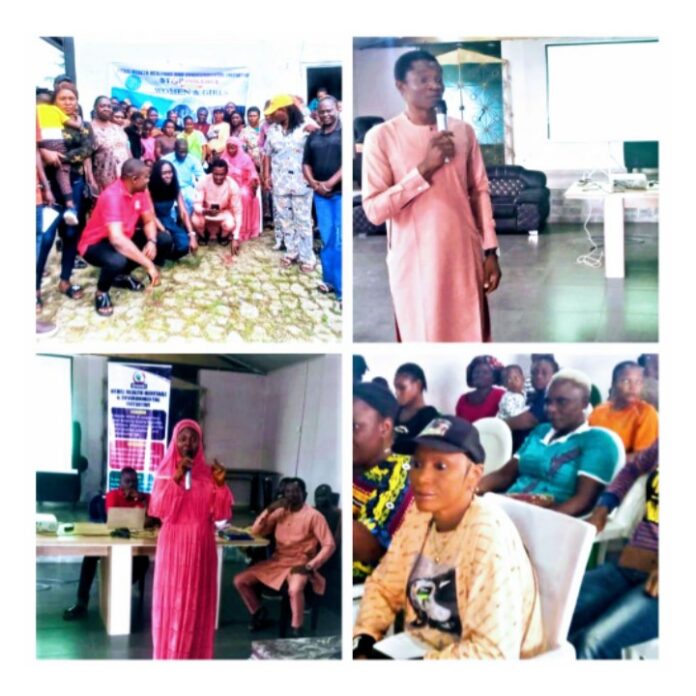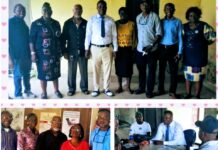By Emeka Nwokocha
A non governmental organisation, Otdel Health Heritage Environmental Initiative (OHHEI), with support from Nigerian Women Trust Fund (NWTF), is taking frontal steps to equip community people with necessary skills to advocate against Gender Based Violence (GBV) and promote women and girls’ rights for a better Nigeria.

OHHEI demonstrated this initiative on Tuesday 29 July, 2025, with a training session for Ugbuwangue community women of Warri South LGA, Delta State, tagged, “Stop Violence Against Women & Girls for a Better Nigeria.”
The training was held at Yonwuren and Agbeje Family Hall, Ugbuwangue, Warri, with over 50 participants in attendance.
The trainer and programme director at OHHEI, Mr. Peter Olayinka, said, “The training aims to empower the women with skills to combat gender-based violence (GBV) within their community and effectively advocate for the protection of women’s and girls’ rights in Nigeria.

He outlined the core objective of the training to include the following: to increase women understanding of gender based violence and Intimate Partner Violence (IPV); causes and its devastating impact on individuals, families and communities; to build capacity of participants in the provision of first line support to GBV survivors; and to engage relevant stakeholders towards addressing GBV among women and girls.
Continuing, Olayinka, noted that violence against women and girls is a recurring human rights issue the world over, adding that 1 in 3 women globally experiences physical or sexual violence in their lifetime.
He said, “Despite decades of advocacy and reported progress in legal frameworks, millions of women and girls in the world, including Nigeria continue to face harm from physical, sexual, psychological, emotional and economic violence.”
He charged the women to leverage the training and build capacity on how to protect their rights and curb GBV in their community and Nigeria.
The training session covered a wide range of topics relating to GBV such as Defining and understanding different forms of GBV – physical, sexual, psychological, and economic violence; Importance of women in decision making; Barriers to women inclusion in decision making; Cultural norms; Gender equality; Causes of GBV; Socialisation of gender roles; Acceptance of violence; Unequal power dynamics; Discrimination and stereotypes; Lack of education and opportunities; Patriarchal structure; Anger management; low self-esteem; Poverty; Consequences of violence and exclusion; and Legal frameworks to fight GBV in Nigeria such as the VAPP Act 2015, Child rights Act, Criminal code, Penal code, and the Convention on the Elimination of all forms of Decision making Against Women (CEDAW).
Adding her perspective, the Communication Manager at NWTF, Mujidat Agbabiaka-Sheleye spoke elaborately about the harm gender based violence causes to society, stressing the compelling need for a collective effort to stem the scourge.
She emphasized the need for women and girls in society to play a frontal role in the campaign against gender based violence in all its forms.
Continuing, she charged parents to nurture and encourage female children to aspire to great heights in various fields of knowledge, even as she called on stakeholders to collectively join hands to end violence against women and girls.
Mujidat stated that significant progress had been recorded by the Nigerian Women Trust Fund campaign against GBV, saying, “Women are willing to speak against GBV now than before.”
She noted that, “Over 800 Women and Girls across the country have being trained and mentored to be champions of the fights against violation of the rights of women and girls in their various communities,” adding that, “These women have equally been trained and mentored to be leaders and the voice for other women.”
She added, “With the NWTF’s ongoing campaigns, women’s rights and women led organisations have been strengthened for champion more impactful initiatives across Nigeria.”
“Over 80 organisations have received small grants to push the campaign against GBV deeper into the hinterlands,” she stated.
Appraising the role of government in the fight against GBV, she stated, “Nigerian government has made some efforts by putting in place policies and laws, like the VAPP Act to curb the acts of violence against persons in Nigeria.
However, the people need to test the law when such GBV cases arise.”
She added, “The public needs to always report such cases of GBV and see that perpetrators are brought to book.”
She assured of NWTF’s commitment to partner with stakeholders to ensure cases of GBV are timely responded to by relevant law enforcement agencies.
“The Nigerian Women Trust Fund will continue to engage other partners, critical stakeholders, mentors and mentees across the country to respond to cases swiftly when they are brought to their notice and ensure justice is served, and engender a safe society where every form of GBV is eschewed,” she stated.
Speaking on behalf of the participants, Ms Roli Omotsola, woman leader of Ugbuwangue community, and Mrs. Linda Ogbe, expressed their gratitude to the OHHEI and NWTF for the training and pledged to utilize the knowledge gained to effectively advocate against GBV in their community.
Also speaking, the vice chairman of Ugbuwangue community, Mr. Solomon Ojobor commended OHHEI and NWTF for organizing the programme, stating that such enlightenment would have a lasting impact on the women in their collective action to fight against GBV and champion advocacy to promote women and girls’ rights.
The event attracted officers of the Civil Society Organisations (CSOs), including Mr. Austin Uwede, and Ms. Joyce Ukuedejor of the Ministry of Women Affairs, Warri.












